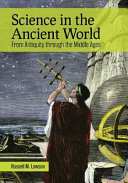2018 School Spending Survey Report
Science in the Ancient World: From Antiquity Through the Middle Ages
COPY ISBN
 Here, Lawson (history, Northeastern State Univ.; Servants and Servitude in Colonial America) asserts that modern science has evolved out of humankind’s need to impose organization and understanding on the world. Making connections between science and mythology, magic, soothsaying, and math, he cites a variety of sources, including ancient works (e.g., The Epic of Gilgamesh; Hippocrates’s Law of Medicine). Lawson draws parallels between modern and ancient sciences and reveals that early scientists were priests, government officials, rulers, authors, enslaved people, artists, and abstract thinkers. His work spans pre-civilization (3500 BCE) to the beginning of the Scientific Revolution (1500 CE) in ancient Greece and Rome, medieval Europe, ancient and medieval Asia, and the Americas. A basic chronology from 2,600,000 BCE to 1650 CE and a separate cumulative bibliography (organized by period, region, primary sources, secondary sources, and general sources) provide additional information. Though the book could benefit from a few illustrations of some lesser-known early tools or inventions, it’s nevertheless beautifully organized and filled with valuable insights. The title expands on Lawson’s Science in the Ancient World: An Encyclopedia and is more narrowly focused than Ofer Gal’s The Origins of Modern Science: From Antiquity to the Scientific Revolution or James E. McClellan III and Harold Dorn’s Science and Technology in World History: An Introduction.
Here, Lawson (history, Northeastern State Univ.; Servants and Servitude in Colonial America) asserts that modern science has evolved out of humankind’s need to impose organization and understanding on the world. Making connections between science and mythology, magic, soothsaying, and math, he cites a variety of sources, including ancient works (e.g., The Epic of Gilgamesh; Hippocrates’s Law of Medicine). Lawson draws parallels between modern and ancient sciences and reveals that early scientists were priests, government officials, rulers, authors, enslaved people, artists, and abstract thinkers. His work spans pre-civilization (3500 BCE) to the beginning of the Scientific Revolution (1500 CE) in ancient Greece and Rome, medieval Europe, ancient and medieval Asia, and the Americas. A basic chronology from 2,600,000 BCE to 1650 CE and a separate cumulative bibliography (organized by period, region, primary sources, secondary sources, and general sources) provide additional information. Though the book could benefit from a few illustrations of some lesser-known early tools or inventions, it’s nevertheless beautifully organized and filled with valuable insights. The title expands on Lawson’s Science in the Ancient World: An Encyclopedia and is more narrowly focused than Ofer Gal’s The Origins of Modern Science: From Antiquity to the Scientific Revolution or James E. McClellan III and Harold Dorn’s Science and Technology in World History: An Introduction.
VERDICT Loaded with oddball tidbits that will fascinate trivia fans, Lawson’s book will complement other ancient history titles, such as Will and Ariel Durant’s “Story of Civilization” series. A true multidisciplinary resource, it will appeal to general readers as well as high school and undergraduate students.
ALREADY A SUBSCRIBER? LOG IN
We are currently offering this content for free. Sign up now to activate your personal profile, where you can save articles for future viewing




Comment Policy:
Comment should not be empty !!!